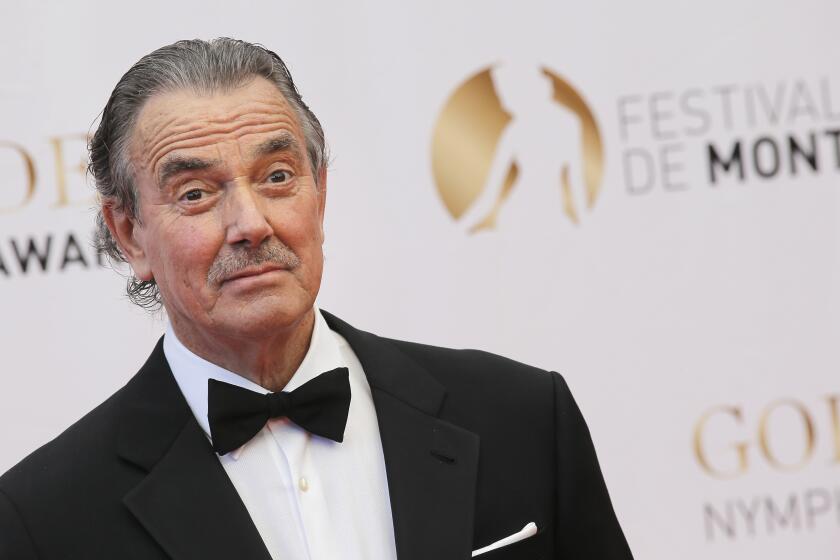Datebook: Portraits of peers, collages inspired by the African diaspora and art for feline lovers
Imagery remixed and paintings that capture an intersection of L.A.’s artistic and music scenes. Plus: cats and more cats! Here are four exhibitions and events to check out in the coming week:
Shizu Saldamando, “To Return,” at Charlie James Gallery. The Los Angeles-based artist’s first solo exhibition at the gallery gathers stark portraits that depict friends, acquaintances, activists and fellow artists who inhabit the intersecting worlds of the city’s art and music scenes — such as performance artist Gabbi Ruiz and punk singer Martin Crudo. The new works include detailed graphite drawings, painting and collage on raw wood panels. Through July 14. 969 Chung King Road, Chinatown, Los Angeles, cjamesgallery.com.
Todd Gray, “Portraits,” at Meliksetian Briggs. The Los Angeles artist, who recently received a prestigious Guggenheim Fellowship, is known for creating multimedia collages and assemblages that take photographic imagery from his own archive and then presents them in ways that comment on representations of blackness and the African diaspora. The work, part of his “Exquisite Terribleness” series, is centered on images of acquaintances and friends as well landscape and objects. Opens Friday at 6 p.m. and runs through Sept. 15. 313 N. Fairfax Ave., West Hollywood, meliksetianbriggs.com.
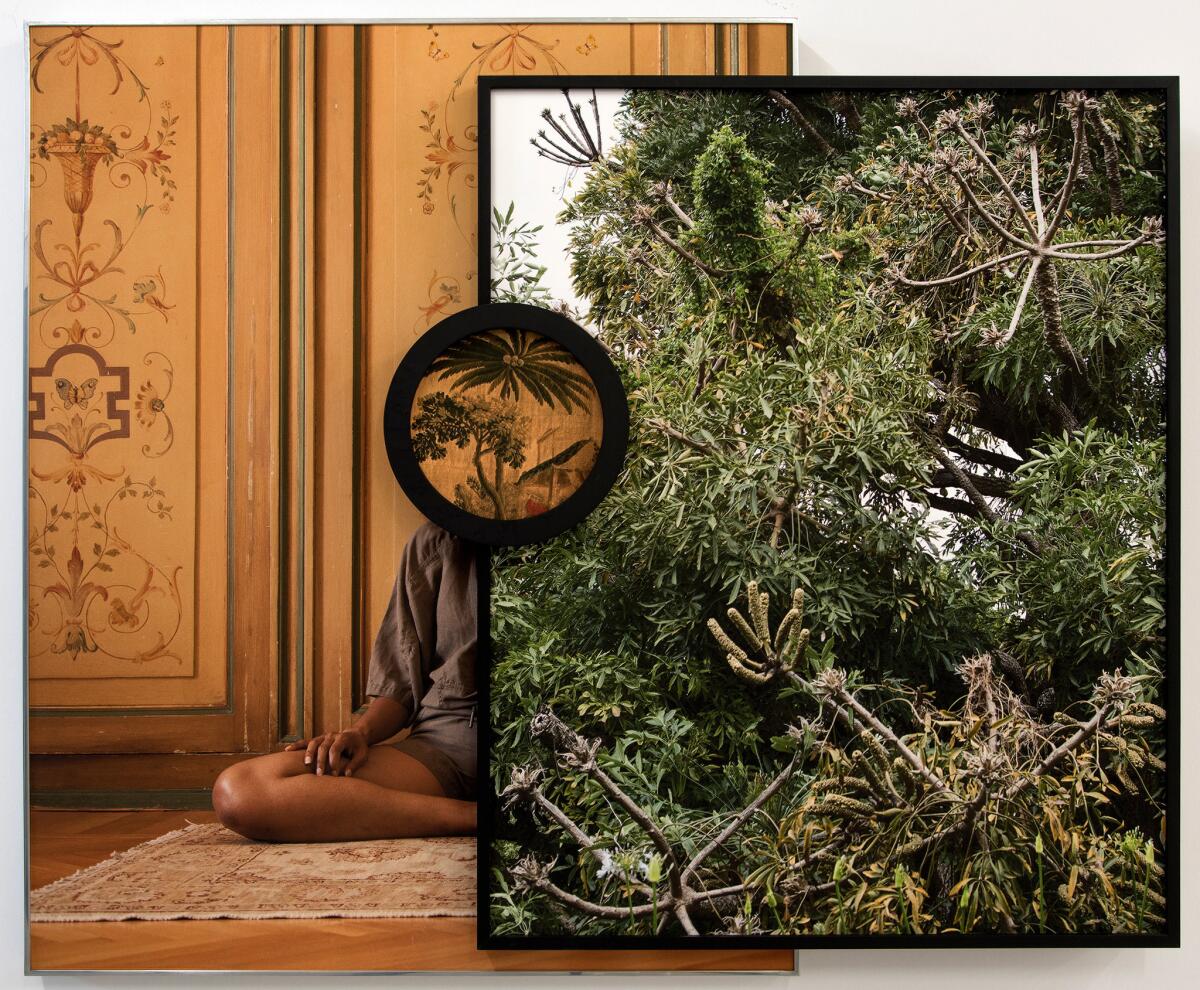
“The New Contemporaries,” at Residency Art Gallery. A new group show at this Inglewood space looks at how African American and Latino bodies and culture have been fetishized, appropriated and experimented on. This includes new work from emerging artists around the country such as Felipe Baeza, texas isaiah, Star Montana and Elliot Reed, among others. Opens Saturday at 6 p.m. and runs through Aug. 25. 310 E. Queen St., Inglewood, residencyart.com.
“Cat Art Show 3: The Sequel Returns Again,” at Think Tank Gallery. Things that are sublime: raccoons scaling tall buildings and paintings of cats. St. Paul, Minn., has a lock on the former. Thankfully, Los Angeles has the latter. Expect 140 works by 100 artists, including graphic artist Edel Rodriguez, photographer Ellen von Unwerth, painter Marion Peck, tattoo artist Jeffery Page, political poster legend Robbie Conal, Raymond Pettibon, Korin Faught and many more. Opens June 14 at 8:30 p.m. and runs through June 24. 939 Maple Ave., downtown Los Angeles, catartshow.com.
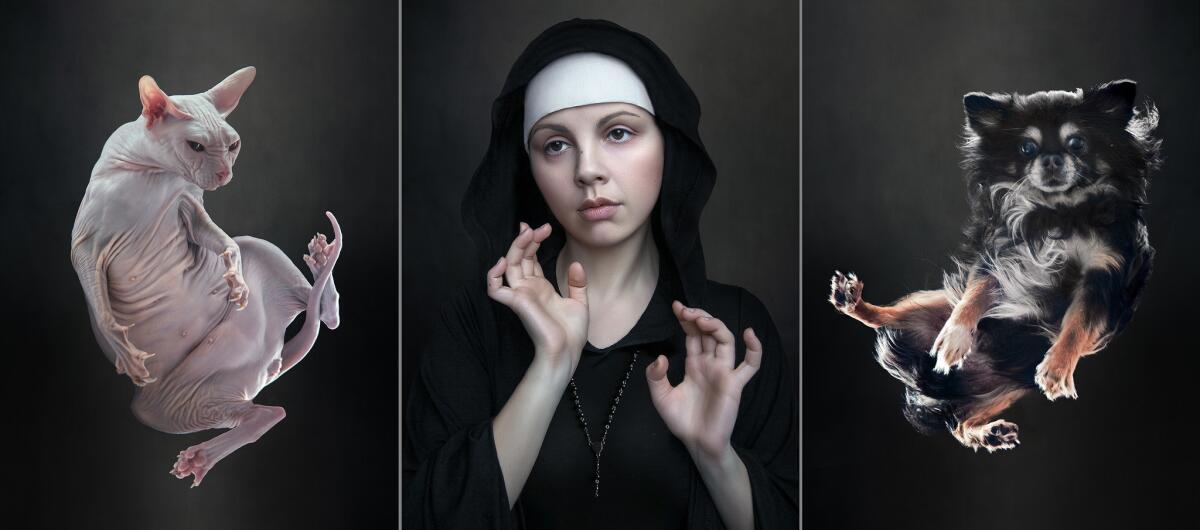
Signs of Los Angeles: A Conversation on Sign-Painting and the City, at the Institute of Contemporary Art Los Angeles. Sign painter Doc Guthrie and Los Angeles artist Michael C. McMillen get together to talk about the ways in which the city once served as broad canvas to legions of sign painters. Artist and educator Tucker Neel moderates. Wednesday at 7:30 p.m. 1717 E. 7th St., downtown Los Angeles, theicala.org.
LAST CHANCE
Deborah Roberts, “Fragile but Fixable,” at Luis De Jesus Los Angeles Projects. Based in Texas, the artist is known for creating collages out of found photographs, paintings and drawings. These often depict black girls entering adolescence, evoking moments of drama, strength and joy. It is Roberts’ first solo show in Los Angeles. Through Saturday. 2685 S. La Cienega Blvd., Culver City, luisdejesus.com.
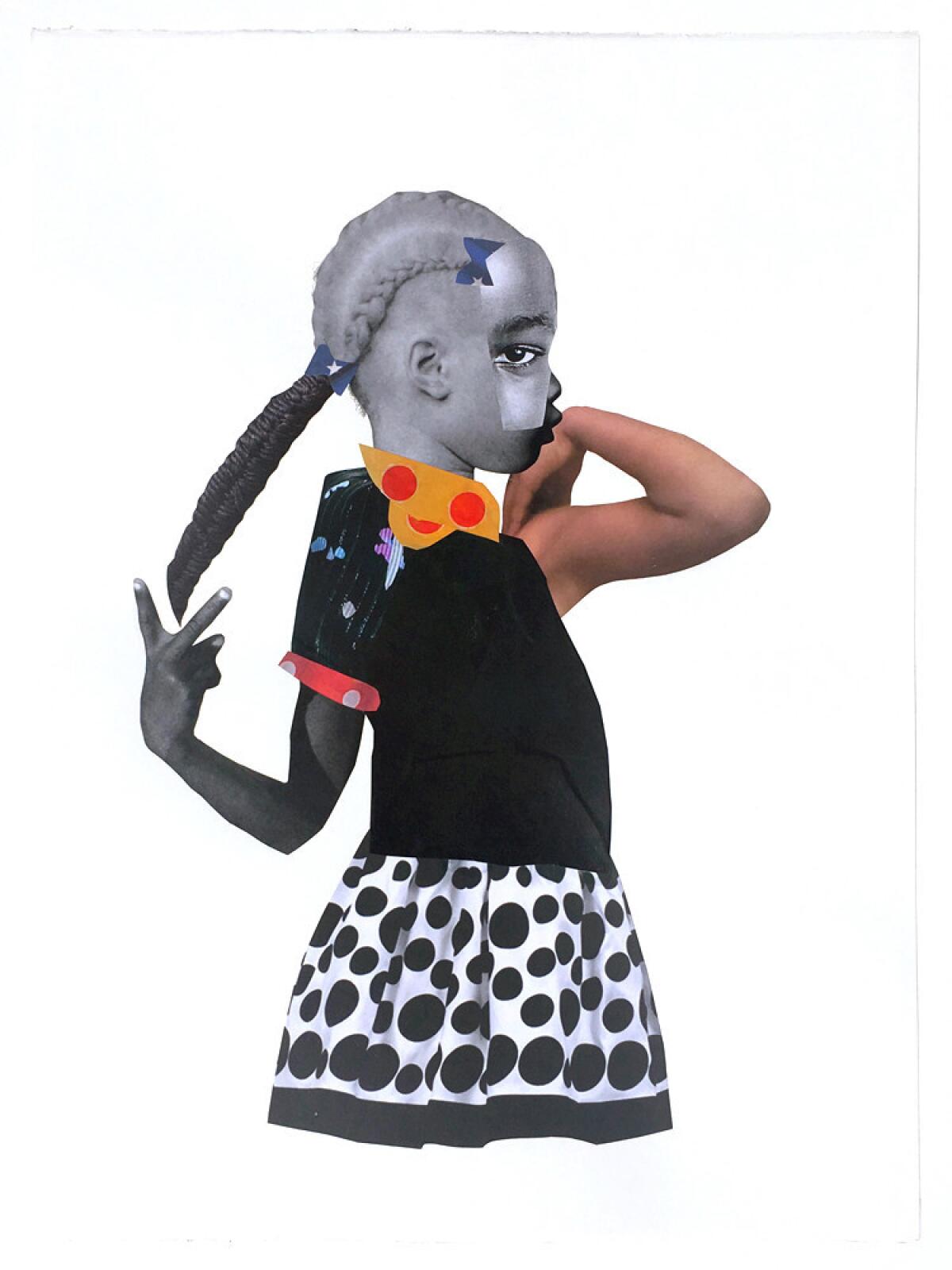
David Donald Sutherland and Chas Schroeder, “Affinity and Distance,” at Chimento Contemporary. This two-person show features the work of a pair of emerging young artists who employ paint in distinct, yet complementary ways. There is Sutherland, who creates smooth, super-flat surfaces consisting of crisp pools of paint. Schroeder, in the meantime, mixes material and technique, creating abstractions that feature solid blocks of acrylic color against bits of spray and transparent, watery shades. This will be the last exhibition at the gallery at its current location. This summer, Chimento is relocating to West Adams. Through Saturday. 622 S. Anderson St., No. 105, Boyle Heights, Los Angeles, chimentocontemporary.net.
Mel Frank, “When We Were Criminals,” at M + B Photo. Back in the ’70s, Mel Frank helped write the literal book on how to grow pot: the 1978 manual “Marijuana Growers’ Guide Deluxe.” He also took a lot of pictures — of the harvest, of plants, of buds, of the botanical processes necessary to cultivate cannabis. This exhibition is the first to bring together the work of this California botanist, writer and photographer whose cannabis cultivation guides served as bibles of weed way before there were such things as private equity firms focused on cannabis. Through Saturday. 1050 N. Cahuenga Blvd., Hollywood, www.mbphoto.com.
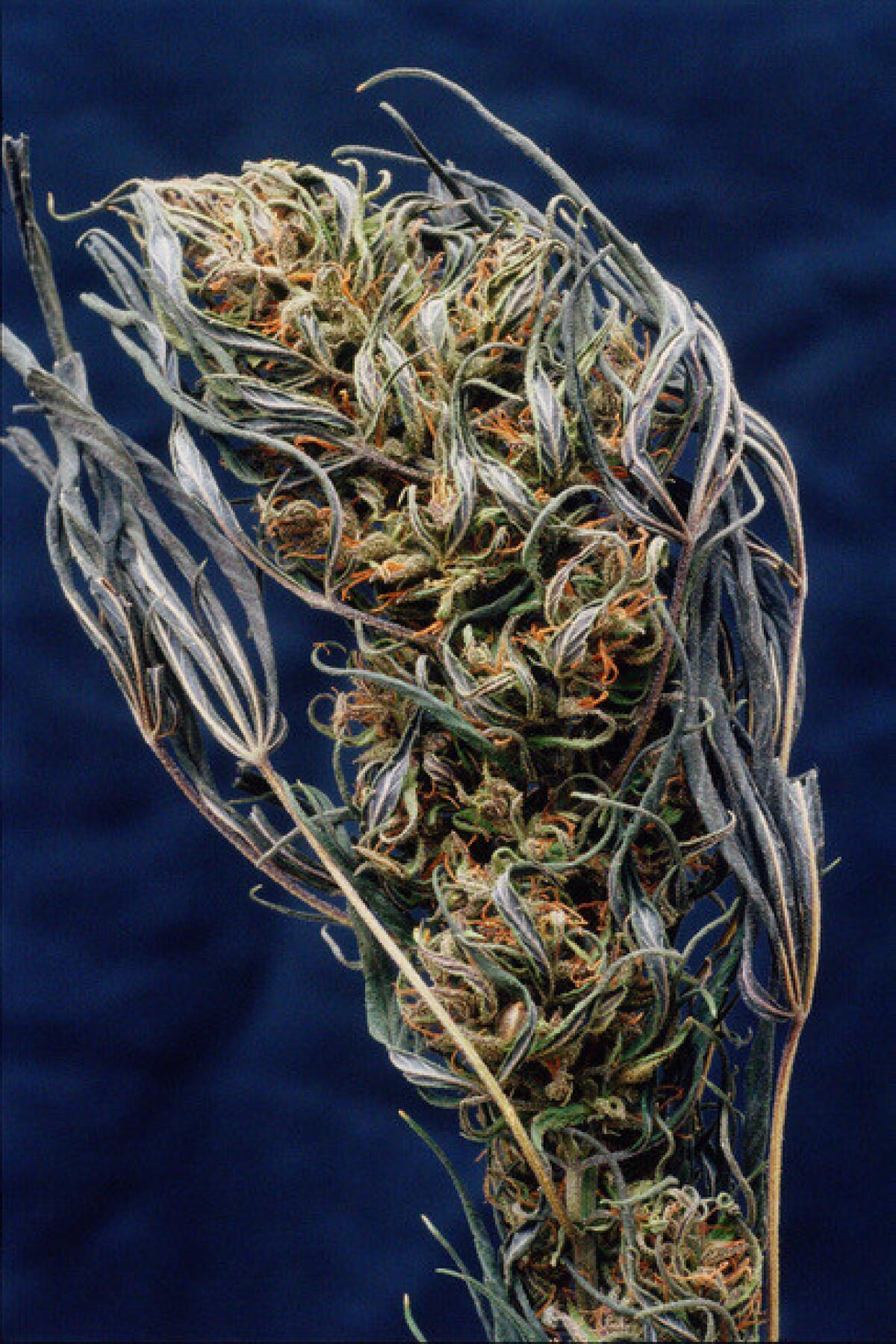
ONGOING
Rafa Esparza, “de la Calle,” at the Institute of Contemporary Art Los Angeles. The Los Angeles artist is transforming the museum project room into a stage for collective works that explore issues of migration and colonization. Esparza and his collaborators will produce an artist book over the course of the exhibition and also stage a performance in Santee Alley. The artist will be leading a walk-through of the exhibition on June 22 at 5:30 p.m. with ICA LA director of education Asuka Hisa. Drinks will follow. Through July 15. 1717 E. 7th St., downtown Los Angeles, theicala.org.
Bailey Scieszka, “Soul Dolphin,” at Park View. Organized by the Detroit-based artist-run space What Pipeline, this exhibition is presenting the work of the Detroit-based painter for the first time. The artist is inspired by vernacular painting, but with a dark twist — imagine brightly hued canvases that feature beings both monstrous and angelic. Through June 23. 836 S. Park View St., No. 8, paulsoto.net.
Marilyn Minter at Regen Projects. The New York-based painter and video artist is known for works that toy with the sensuous and the grotesque — showing fragments of women’s faces and bodies in ways that draw from advertising and pornography. The exhibition at Regen Projects will premiere a new video work and will feature paintings inspired by the art historical trope of the bather. Through June 23. 6750 Santa Monica Blvd., Hollywood, regenprojects.com.

The Queer Biennial, in locations around Los Angeles. Featuring film, live performance, dance, a naked dinner party and even a queer-centric zine-fest, this broad survey looks at what is happening in various areas of LGBTQ culture. None other than film director and painter John Waters will kick off the proceedings at an opening reception Friday that will also feature performance and live tattooing. (RSVP via the website is required.) Through June 24. Check the website for a full list of events and locations, queerbiennial.org.
Gilbert “Magu” Luján, “Recuerdos del Futuro: Roaming Magu’s Chicano Dreams,” at La Plaza de Cultura y Artes. This show on the late artist, a founding member of the influential collective Los Four, gathers 81 works — including paintings, drawings and sculpture — that tracks the ways in which he employed quotidian imagery to channel a Chicano futurist vibe. Embedded in his paintings and surreal installations were images of graffiti, lowriders, dogs and elements of the rasquache (or lowbrow). As part of the show, two contemporary artists — calligraphy artist JERK and printmaker Daniel Gonzalez — created work in dialogue with Magu. Through June 25. 501 N. Main St., downtown Los Angeles, lapca.org.
Reena Spaulings, “The Male Gates,” at Matthew Marks Gallery. The artist collective (which also operates a gallery by the same name) has a new show at Matthew Marks that consists of paintings on canvas and walk-through security gates (the sort you find at airports and nightclubs and some museums). Also on view are two new marble sculptures, including one made from the same blue stone employed by Modernist architect Adolf Loos in the Semler House in the Czech Republic. Through June 30. 1062 N. Orange Grove, West Hollywood, matthewmarks.com.
Meleko Mokgosi, “Bread, Butter, and Power,” at the Fowler Museum. Mokgosi first drew wide attention in Los Angeles when he won the $100,000 inaugural Mohn Prize at the Hammer Museum’s “Made in L.A.” biennial in 2012. Now he’s back with a large-scale painting exhibition at the Fowler — a 20-panel installation that looks at how democratic concepts infuse aspects of daily life, down to love and relationships. Through July 1. 308 Charles E. Young Drive North, Westwood, Los Angeles, fowler.ucla.edu.
Asad Faulwell, “Phantom,” at Denk Gallery. For some time, the Iranian American artist has explored the stories of the female combatants who fought against the French colony in the Algerian war of Independence of 1954-62. His latest works in “Phantom” continue that exploration, referencing the anonymous warriors who helped make independence possible, while creating works that draw from rich Islamic traditions, including textiles, mosaic and architecture. Through July 7. 749 E. Temple St., downtown Los Angeles, denkgallery.com.

Hannah Wilke, “Drawing and Sculpture,” at Marc Selwyn Fine Art. The late artist was known for feminist work that toyed with ideas about the female body and the male gaze. This show is displaying her lesser-known drawings on paper — exuberant pieces that straddle the line between figurative and abstract. A fresh way to look at an artist who came to public attention primarily through her video. Through July 7. 9953 S. Santa Monica Blvd., Beverly Hills, marcselwynfineart.com.
Torbjørn Rødland, “Backlit Rainbow,” at David Kordansky Gallery. The Norwegian-born, L.A.-based photographer is known for creating unsettling images born out of staged scenarios that read like a weird cross between dark stock photography and sci-fi. (Imagine an image of a perfectly manicured foot covered in a weird, transparent goo.) The show will also include a video work, “Between Fork and Ladder,” that follows the adventures of a boy engaged in a series of surreal actions. Through July 7. 5130 W. Edgewood Place, Mid-Wilshire, davidkordanksygallery.com.
“Rodriguez/Valadez in Vernon,” at Fine Art Solutions. This two-painter show brings together work by L.A. painters Sandy Rodriguez and John Valadez, whose views of the city are often infused with dark humor — and just a little touch of the magical. Rodriguez also makes wry paper works that riff on painted colonial and pre-Columbian codices in contemporary ways. Open by appointment only and runs through July 7. 3463 E. 26th St., Vernon, fineartssolutionsinc.com.
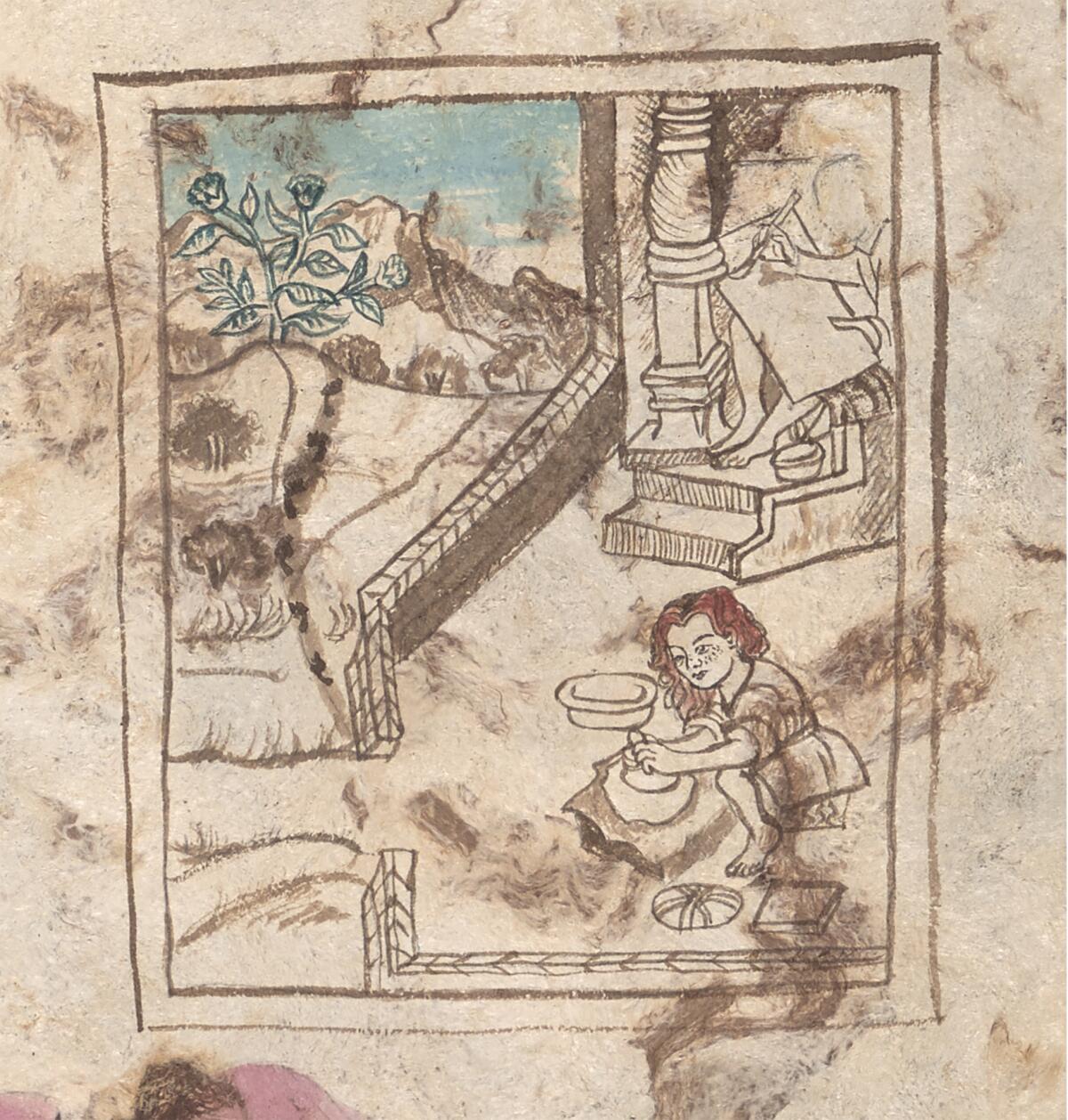
Esther Pearl Watson, “Tire Universe,” at Susanne Vielmetter Los Angeles Projects. In paintings evocative of folk art — albeit folk art of an absurdist stripe — Watson pays tribute to the curious memories of her youth in rural Texas, as the daughter of a father who liked to build flying saucers. In funny, faux naif canvases, she renders images of highways, farmland, pumpjacks and the broken down family station wagon. Also on view are paintings by abstract artist Caitlin Lonegan and Mark Todd, who makes works that evoke cartoonish record covers. Through July 12. 6006 Washington Blvd., Culver City, vielmetter.com.
“Soul Mining,” at the Vincent Price Art Museum. A new group show examines the influence Asian immigrants have had on the economics and the culture of Latin America. Some of this connects with the anti-immigration histories of the U.S.: When the Chinese Exclusion Act was signed into law in 1882, Chinese laborers expelled from the U.S. moved on to Latin America, having a profound effect on the continent’s social, political and cultural landscapes. Also on view are works from the L.A. County Museum of Art’s permanent collection: the Mexico photographs of Mariana Yampolsky and objects from the museum’s holdings of ancient Egyptian art. Through July 14. East Los Angeles College, 1301 Cesar Chavez Ave., Monterey Park, vincentpriceartmuseum.org.
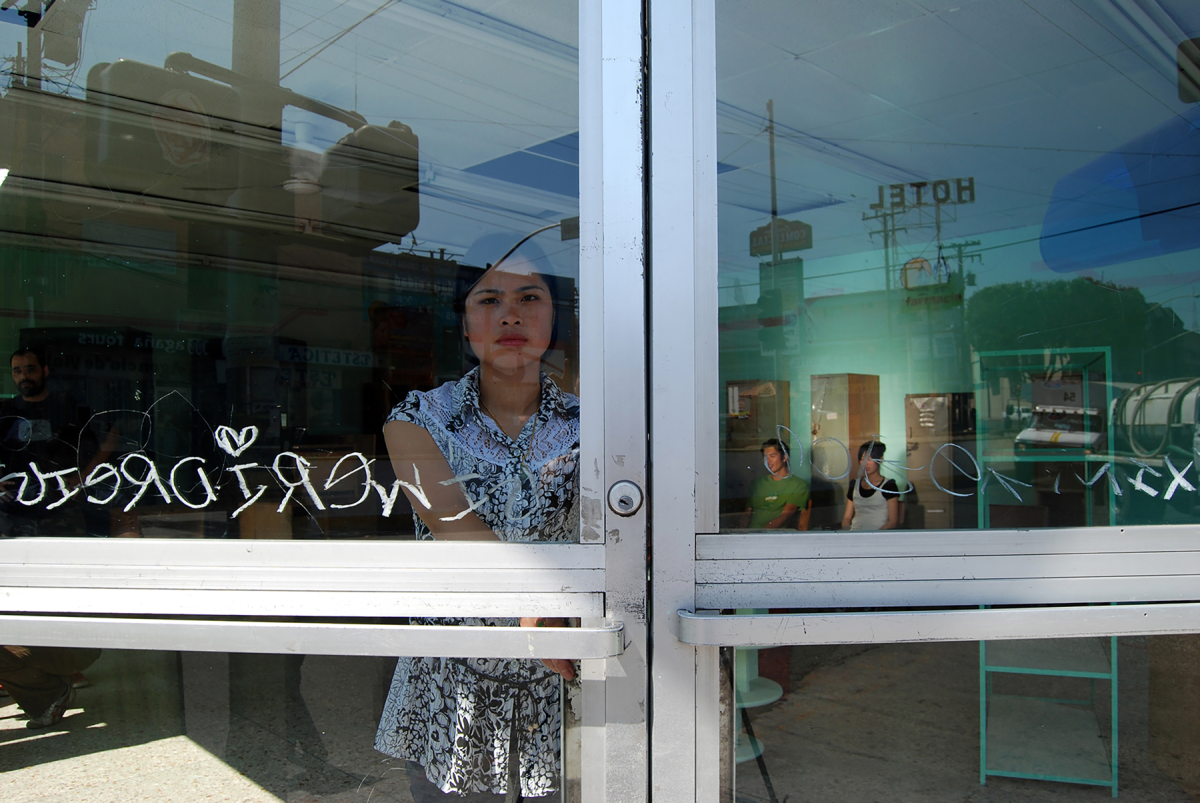
Stephen Prina, “galesburg, illinois+,” at Sprüth Magers. This exhibition is part of an ongoing autobiographical project by the artist in which he examines the nature of the small town he grew up in: Galesburg, Ill.. The installation includes collectible ceramics and other souvenirs that reference his personal memories as well as Galesburg’s social and geographic contexts. Through July 14. 5900 Wilshire Blvd., Mid-Wilshire, Los Angeles, spruethmagers.com.
George Rodriguez, “Double Vision,” at the Lodge. The Los Angeles photographer has covered iconic musical events (the Doors at the Whisky a-Go-Go, anyone?), key civil rights happenings (the East L.A. walkouts and the farmworkers strikes of the ’60s) and so much in between. A new book, published by Hat & Beard Press and titled “Double Vision,” gathers a wide selection of his life’s work, which covers an intersection of Los Angeles people, neighborhoods and events. The show will allow visitors to get up close and personal to some of his key images. Through July 14. 1024 N. Western Ave., East Hollywood, Los Angeles, thelodge.la.
Jonathan Lyndon Chase, “Sheets,” at Kohn Gallery. In ebullient works that meld painting, drawing and collage, Chase explores quotidian moments in the lives of queer black men — sculpturally contorted figures shown in repose, in heated moments of desire and in balletic occasions of joy. He also plays with the signifiers of gender identity, showing men wearing makeup and other supposedly feminine things — men, ultimately, who embrace all aspects of who they are. Through July 14. 1227 N. Highland Ave., Hollywood, kohngallery.com.
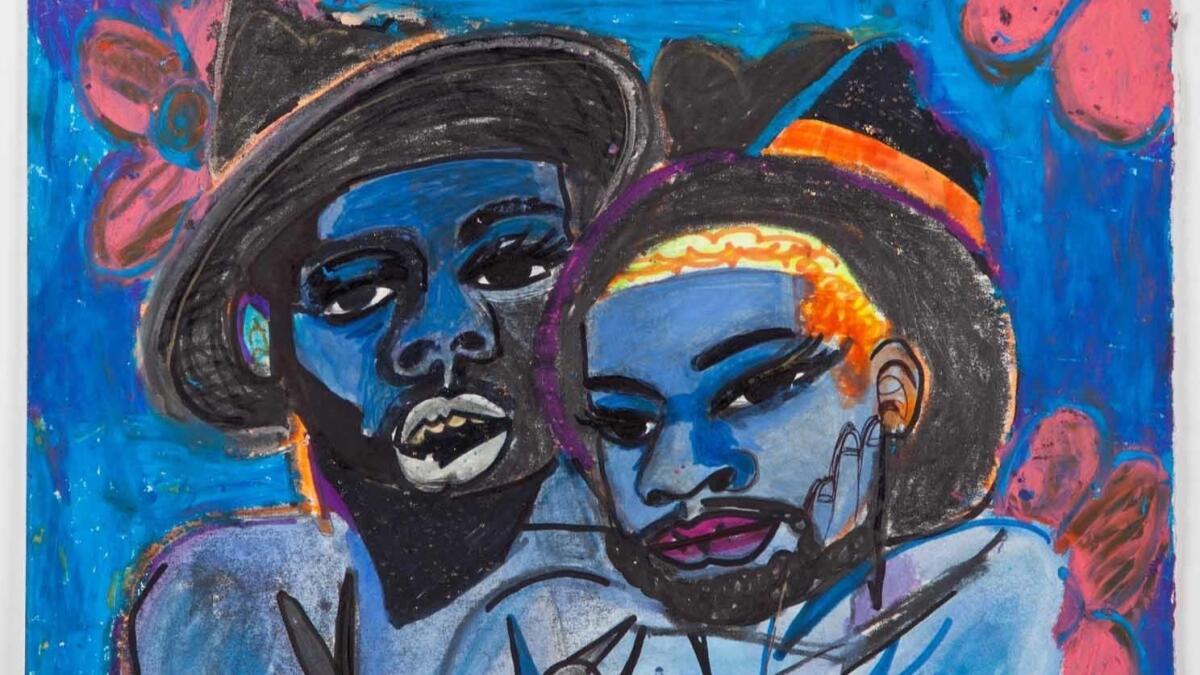
Leopoldo Peña, “Pelotas Oaxaqueñas/Oaxacan Ball Games,” at the Fowler Museum. For five years beginning in 2011, the L.A.-based painter documented the traditional games played by California’s Oaxacan immigrant community. The games includes the centuries-old pelota mixteca (Mixtec-style ball) and variant called pelota de esponja (sponge ball), both played with decorated mitts that combine indigenous design with contemporary logos. The games, which often take place in empty lots around the San Fernando Valley, are fast-paced affairs that serve as important social gatherings. Through July 15. 308 Charles E. Young Drive North, Westwood, Los Angeles, fowler.ucla.edu.
“City and Cosmos: The Arts of Teotihuacan,” at the Los Angeles County Museum of Art. In its day, the ancient city of Teotihuacan was the largest urban center in the Americas — and the sixth-largest city in the world. Today, it is an iconic Mexican archaeological site. This exhibition presents recent findings from excavations at the site’s three main pyramids. It includes more than 200 objects that help tell the story of the ancient city, including monumental sculpture and smaller-scale objects such as precious stones. Through July 15. 5905 Wilshire Blvd., Mid-Wilshire, Los Angeles, lacma.org.
“Forest for the Trees,” at the Lancaster Museum of Art and History. A series of five exhibitions looks at the symbiotic relationship between humans and trees — tracking relationships both positive and negative. This includes paintings by Constance Mallinson and Greg Rose and a collaboration between Osceola Refetoff and Christopher Langley (known as High & Dry) that features images and words devoted to open spaces and the often destructive ways in which they are used.Through July 15. 665 W. Lancaster Blvd., Lancaster, lancastermoah.org.
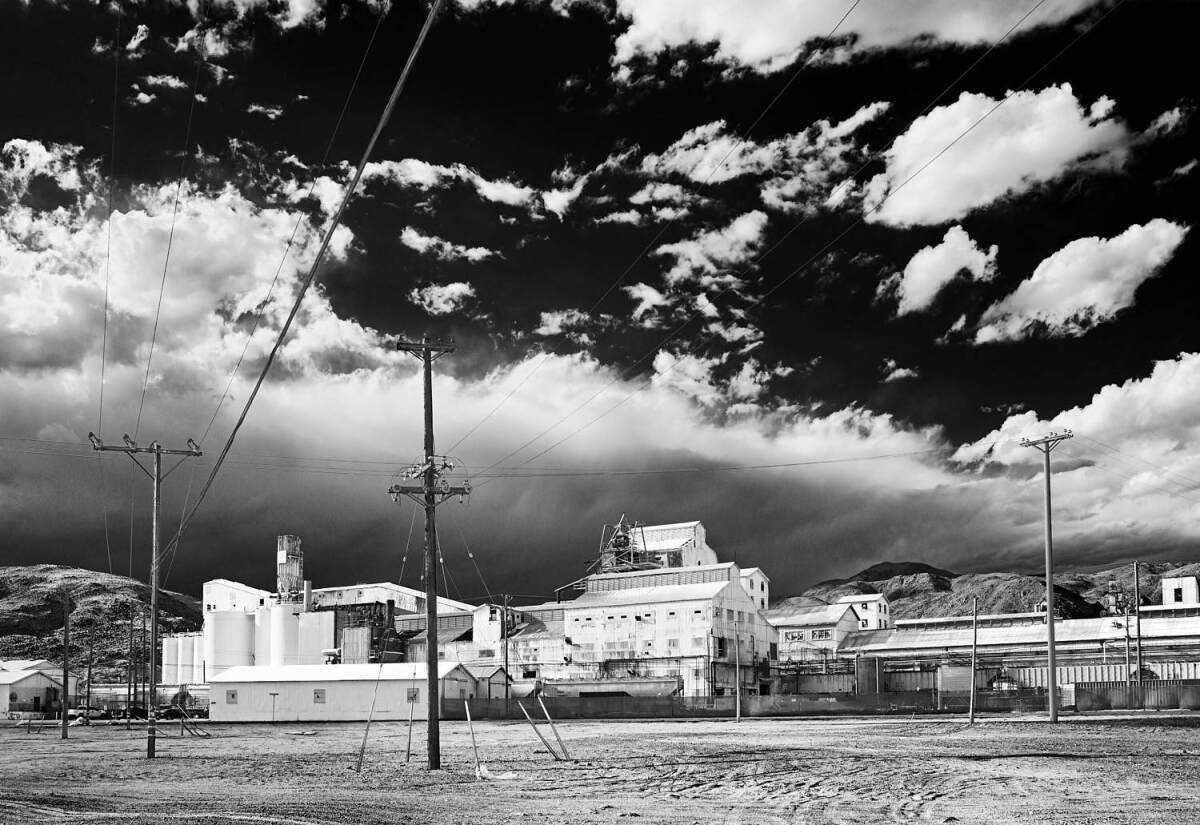
Rafael Cardenas, “Backyard Tableaux,” at the Vincent Price Art Museum. Better known for his black-and-white street images, the Boyle Heights photographer has a new series on display at the museum that explores moments of gathering and celebration in Los Angeles backyards — all shot in rich color. Through July 28. East Los Angeles College, 1301 Cesar Chavez Ave., Monterey Park, vincentpriceartmuseum.org.
Sandow Birk and Elyse Pignolet, “American Procession,” at Track 16. Inspired by a 19th century mural in Dresden, Germany, that shows a procession of important royals and those who came before them, Birk and Pignolet have created two 17-foot-long prints depicting a procession of historical American figures who have made significant contributions to society for better or worse. The two works show figures from either side of the political spectrum facing off at a central point — before a triumphal arch that stands in ruins. Through July 28. Bendix Building, 1206 Maple Ave., downtown Los Angeles, track16.com.
“Extracorporeal,” at the Museum of Latin American Art. Inspired by the art of the late Cuban American artist Ana Mendieta, whose actions and photographs explored violence, place and the body, “Extracorporeal” gathers works by four U.S. and Latin American artists whose work also operates in that vein. This includes sculpture, video and performance by Antonio Paucar, Daniela Rojas, Roberto Tondopó and the L.A.-based Carmen Argote. Through July 29. 628 Alamitos Ave., Long Beach, molaa.org.

“Gary Simmons: Fade to Black,” at the California African American Museum. In a lobby installation — one that takes full advantage of its size and scale — Simmons pays tribute to forgotten African American actors and films. On a black background, the L.A. artist features the titles and names of films and individuals important to the early days of Hollywood history, but forgotten over time. Through July 2018. 600 State Drive, Exposition Park, Los Angeles, caamuseum.org.
Harry Gamboa Jr., “Chicano Male Unbonded,” at the Autry Museum of the American West. For years, Gamboa has photographed Chicano men — often figures with whom he has a personal relationship — at night in the dark from a low angle, giving his figures an imposing authority. This exhibition gathers more than 80 of those images into a single-room installation: scholars, artists, musicians, thinkers, photographers and even the artist’s dad, a printer — collectively calling into question the general public’s (not to mention our president’s) stereotyped view of Mexican American men. Through Aug. 5. 4700 Western Heritage Way, Griffith Park, Los Angeles, theautry.org.
“The Candy Store,” at Parker Gallery. A group show pays tribute to the Candy Store Gallery, a small space operated by Adeliza McHugh in the hillsides above Folsom, Calif., for three decades beginning in 1962. In her time, the idiosyncratic McHugh displayed work by key American artists such as ceramicists Robert Arneson and Chris Unterseher, painters Roy de Forest and Luis Cruz Azaceta and Chicago imagists Gladys Nilsson and Jim Nutt. This show captures the singular nature of that quirky space.Through Aug. 11. 2441 Glendower Ave., Los Feliz, Los Angeles, parkergallery.com.
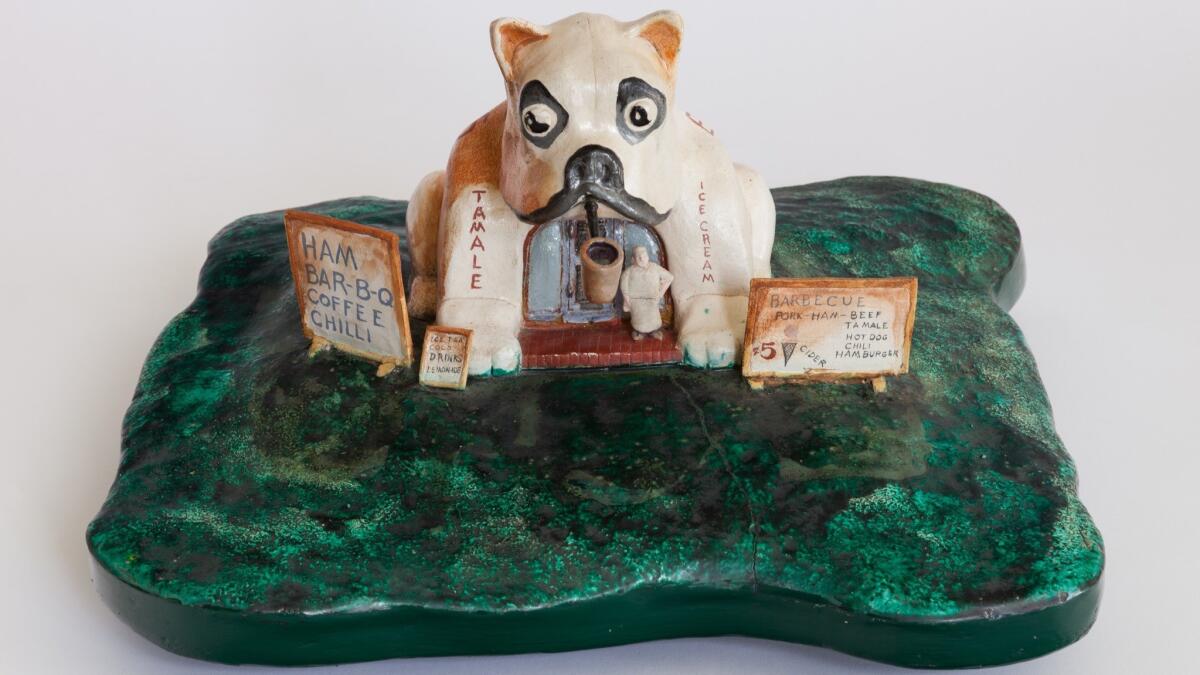
Hannah Kozak, “Survivor: My Father’s Ghosts,” at the Los Angeles Museum of the Holocaust. The Los Angeles photographer retraces her father’s footsteps through eight concentrations camps — capturing the spaces that shaped his life in stark black and white. Through Aug. 20. 100 S. the Grove Drive, Fairfax, Los Angeles, lamoth.org.
James Turrell, at Kayne Griffin Corcoran. Turrell, who is perhaps best known for creating ethereal installations that employ transitory beams of light, is focusing on slightly more concrete materials in this, his seventh show at the gallery. This includes glass works, which he began to fabricate in 2006, as well as models and structures from the late ’80s and early ’90s. Through Aug. 25. 1201 S. La Brea Ave., kayengriffincorcoran.com.
Adler Guerrier, “Conditions and Forms for blck Longevity,” at California African American Museum. The Haitian artist is the subject of a solo exhibition at the museum that explores the nature of domestic gardens and other outdoor spaces as mini-utopias. This project looks at spaces in Miami and L.A. where black life takes place in sheltered, protected ways. Through Aug. 26. 600 State Drive, Exposition Park, Los Angeles, caamuseum.org.
“Socialist Flower Power: Soviet Hippie Culture,” at the Wende Museum. Like just about every other country in the ’60s, the former Soviet Union was home to a hippie culture of peace, love and brotherhood — when it wasn’t being persecuted by the Soviet state. Through a collaboration with the Archive of Modern Conflict and historian Juliane Fürst at the University of Bristol, the Wende was able to acquire a set of personal archives that showcase Soviet hippie artifacts of that era, including photography, clothing and other ephemera. A singular peak into a subculture that has drawn little scrutiny. Through Aug. 26. 10808 Culver Blvd., Culver City, wendemuseum.org.
Olafur Eliasson, “Reality Projector,” at the Marciano Art Foundation. Eliasson has created an environmental installation for the foundation’s first floor Theater Gallery that combines sculpture, painting, photography and film. The piece works with the former Masonic Temple’s existing architecture to create a play on forms and shadows. It’s an installation that Times art critic Christopher Knight describes as “eye-grabbingly vivid.” Through August. 4357 Wilshire Blvd., Windsor Square, Los Angeles, marcianoartfoundation.org.
Sadie Barnette, “Dear 1968, ...” at the Museum of Contemporary Art San Diego. Barnette and her family recently obtained the 500-page file the FBI had amassed on her father, Rodney Barnette, during his time in the Black Panthers. The artist employs documents from the file along with other family objects as a point of inspiration for an installation that explores the intersection of the personal and the political in dramatic ways. Through Sept. 2. 1100 Kettner Blvd., San Diego, mcasd.org.
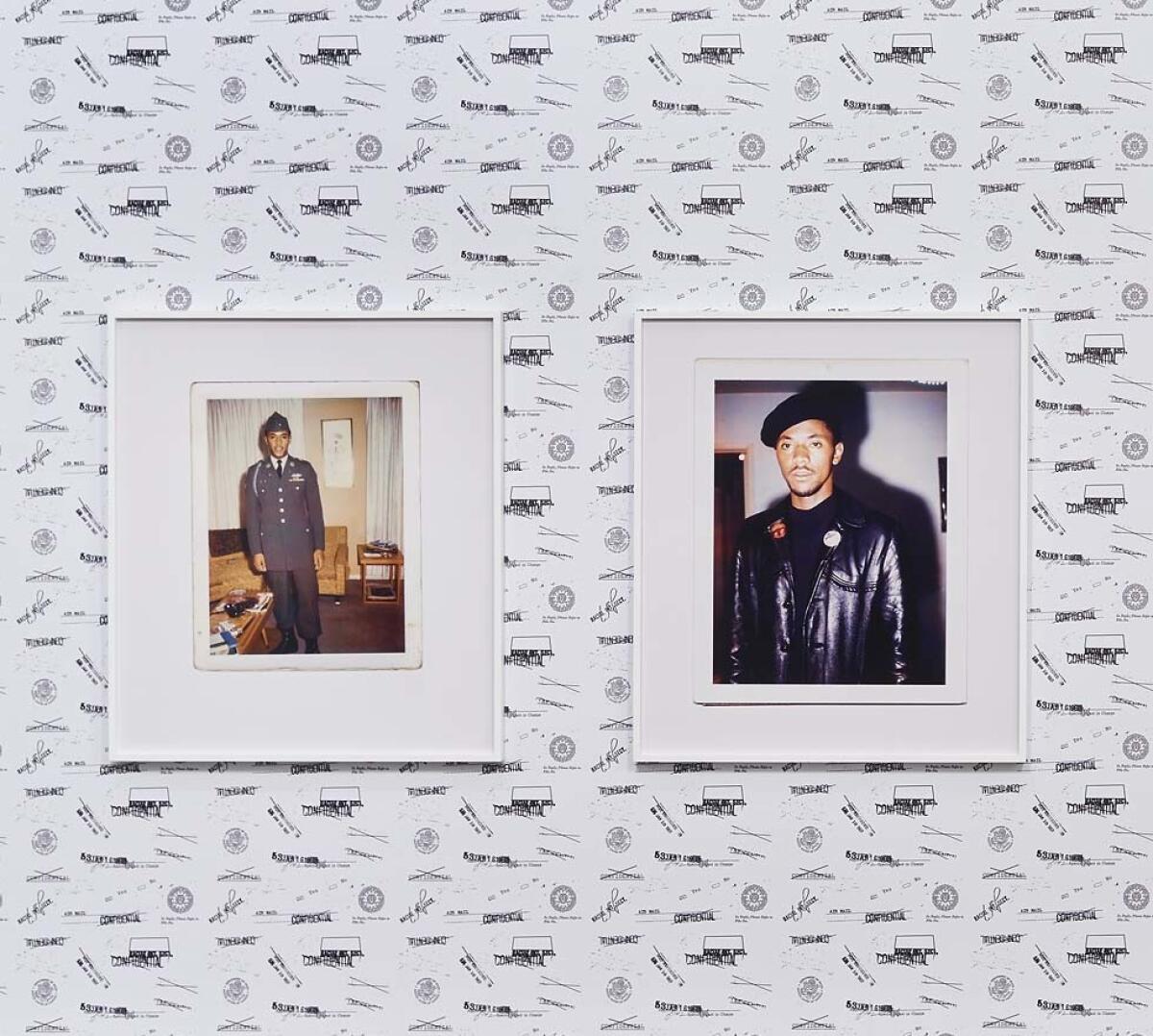
“This Brush for Hire: Norm Laich and Many Other Artists,” at the Institute of Contemporary Art, Los Angeles. Artists have long relied on studio assistants to do everything from preparing materials to executing their work. This exhibition at the ICA LA looks at the work of one of those indispensable assistants: Norm Laich, who has helped produce iconic works for a range of Los Angeles artists, including Ed Ruscha, Paul McCarthy and Barbara Kruger. The show will feature a range of signage, wall paintings and installations and will include a short documentary film on his life and work. Through Sept. 2. 1717 E. 7th St., downtown Los Angeles, theicala.org.
“Made in L.A. 2018,” at the Hammer Museum. It is the fourth edition of the Hammer’s always intriguing biennial and this year’s show, organized by Anne Ellegood and Erin Christovale, brings together a wide ranging group of artists, ages 29 to 97, exploring an even wider range of techniques, ideas and materials. This includes conceptual photographs by John Houck and Daniel Joseph Martinez, an ancient Egyptian-inspired temple by Lauren Halsey, wry videos by Alison O’Daniel and the artist team of Jade Gordon and Megan Whitmarsh, a vast lobby mural by Eamon Ore-Giron and some incredible paintings of the female body — as seen by female artists — by Christina Quarles, Linda Stark and Luchita Hurtado. And that’s just the beginning. Times art critic Christopher Knight describes the show as the best Hammer biennial yet. Do. Not. Miss. Through Sep. 2. 10899 Wilshire Blvd., Westwood, Los Angeles, hammer.ucla.edu.
Lauren Halsey, “we still here, there” at the Museum of Contemporary Art. The artist has taken up residence at the museum’s Grand Avenue location, where she is building a fantastical immersive environment that will evolve over time. Through Sept. 3. MOCA Grand Avenue, 250 S. Grand Ave., downtown Los Angeles, moca.org.
Shinique Smith, “Refuge,” at California African American Museum. The multimedia artist is known for her bulbous assemblages crafted from old clothing and fabric, which she twists and ties and suspends from gallery ceilings and walls. Her paintings echo these bound and squeezed forms. Her first solo show at CAAM brings together works that evoke questions of homelessness and itinerancy. Through Sept. 9. 600 State Drive, Exposition Park, Los Angeles, caamuseum.org.
“Bamboo,” at the Craft and Folk Art Museum. Bamboo baskets are often thought of purely as functional objects: vessels that contain and transport food and household goods. An exhibition at CAFAM, however, explores bamboo basketry’s sculptural possibilities — including a large-scale bamboo installation inspired by mathematics (such as Fibonacci’s sequence and the Golden Ratio) by Japanese architect Akio Hizume. Through Sept. 9. 5814 Wilshire Blvd., Mid-Wilshire, Los Angeles, cafam.org.
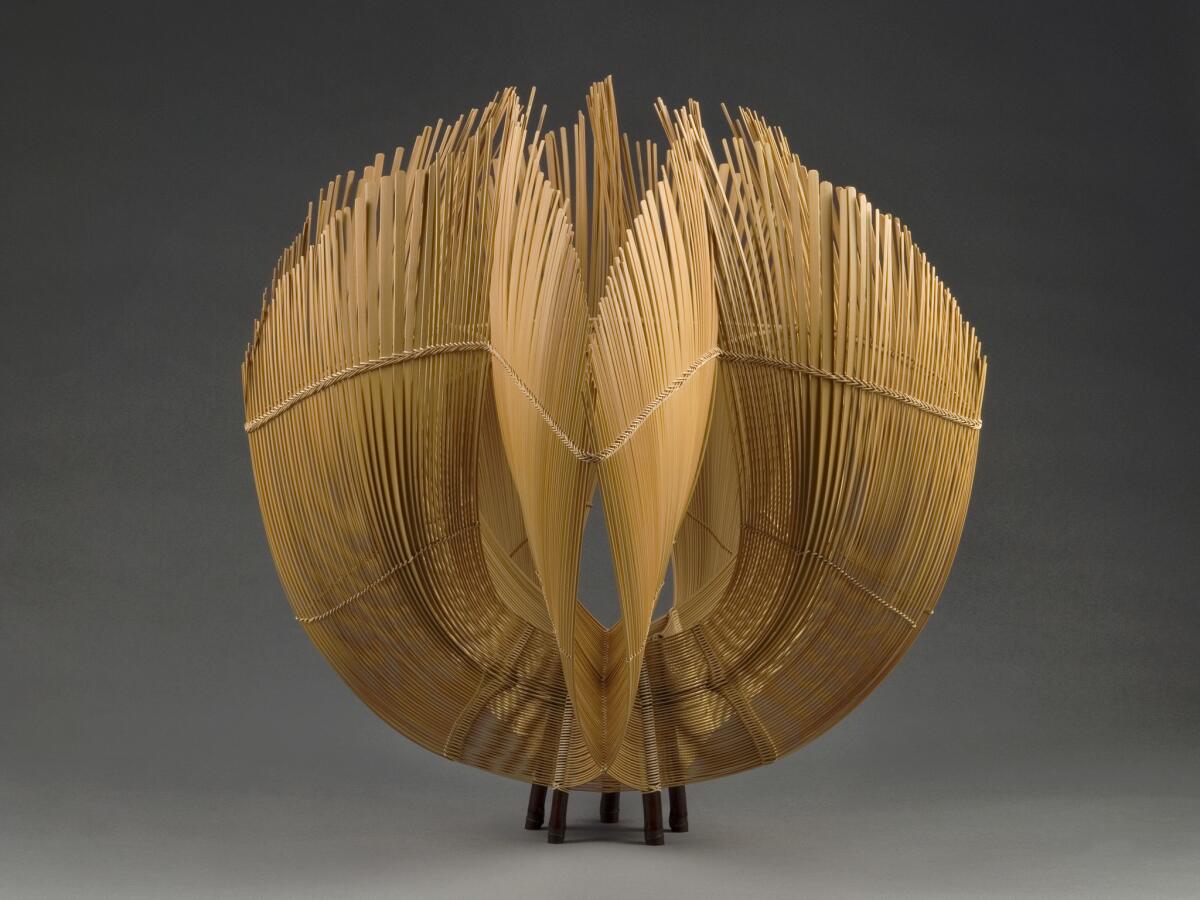
“Charting the Terrain: Eric Mack and Pamela Smith Hudson” at the California African American Museum. A pair of artists explore aspects of Western landscape through abstraction. In his work, Mack creates intricate compositions that echo aspects of movement and the urban grid, while Hudson’s works evoke the topographic — mapping devastation and rejuvenation. Through Sept. 9. 600 State Drive, Exposition Park, Los Angeles, caamuseum.org.
“Beyond the Nile: Egypt and the Classical World,” at the Getty Museum. This exhibition at the Getty explores the cultural connections between Greece, Rome and Egypt through more than 200 rare objects — many on view in the U.S. for the first time. The show spans more than 2,000 years, from the Bronze Age to the late Roman Empire and includes stone vessels, pottery, sculpture, portraits and religious imagery. It also includes a more than 15-foot granite obelisk from A.D. 88-89 inscribed to the goddess Isis and the emperor Domitian, on loan from the Museo del Sannio in Italy. Through Sept. 9. 1200 Getty Center Dr., Brentwood, Los Angeles, getty.edu.
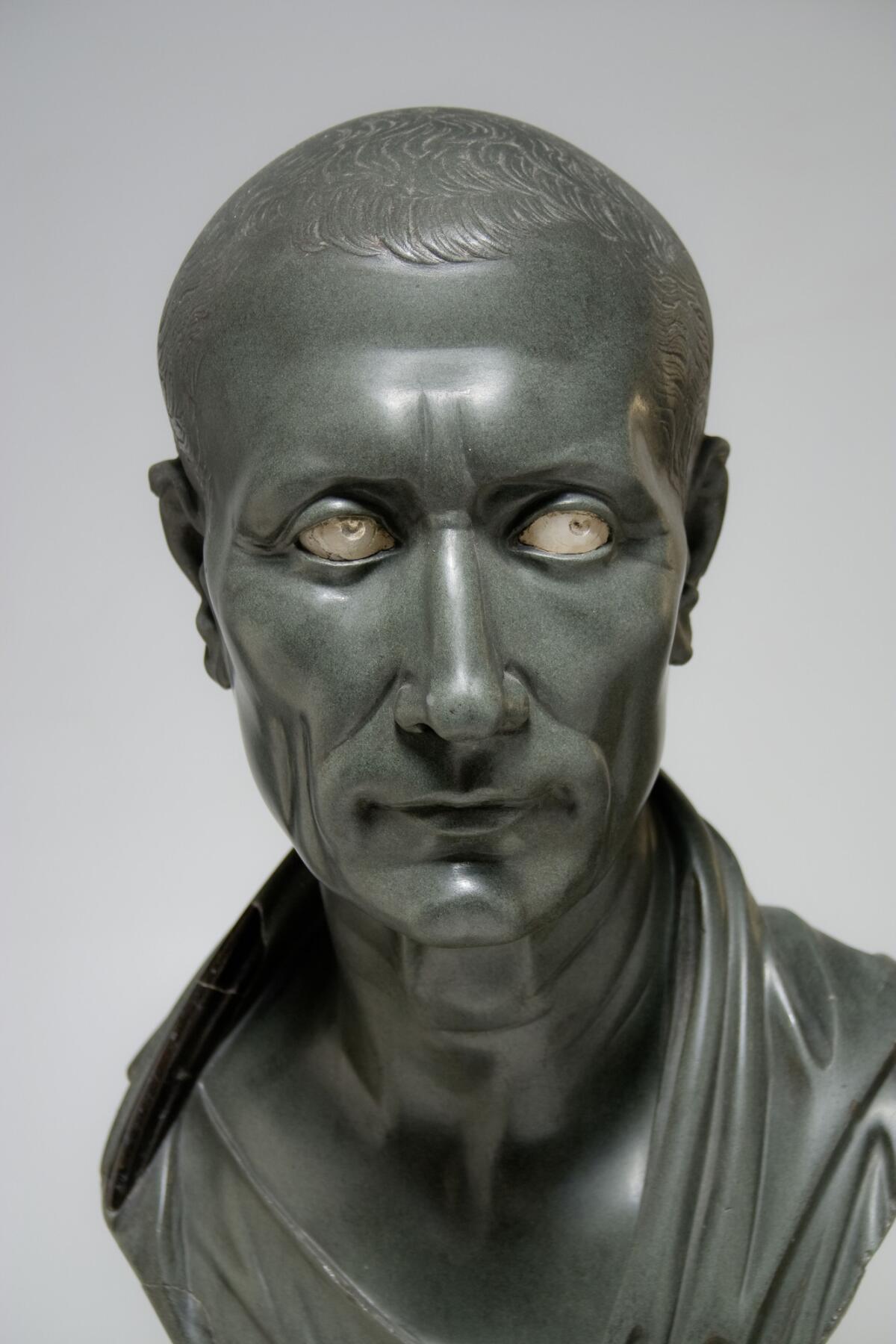
“Discovering Saar Ceramics,” at the American Museum of Ceramic Art. In 1949, artist Richard Saar and his brother William opened a ceramic studio in a small Quonset hut in El Segundo. Saar Ceramics, at its height, would go on to employ a staff of eight and produce functional and decorative pieces with elegantly rendered abstract designs and charming animal figures. Does the name sound familiar? Well, Saar was, for a time, married to key Los Angeles assemblagist Betye Saar in the 1950s and ’60s. Through Sept. 16. 399 N. Garey Ave., Pomona, amoca.org.
John Divola and Zoe Crosher, “Grounded,” at the El Segundo Museum of Art. In the 1970s, photographer John Divola explored the homes and other buildings that were condemned by an expansion of LAX airport in an area referred to as the Noise Abatement Zone. Thirty years later, Zoe Crosher captured the ways in which the airport makes its presence felt in daily life in the surrounding communities. This exhibition at ESMoA brings together dozens of their works, shot decades apart, for a unique view of a transitory space that marks the city in permanent ways. Through Sept. 22. 208 Main St., El Segundo, esmoa.org.
“In Focus: Expressions,” at the Getty Center. An exhibition drawn from the museum’s permanent collection brings together portraits, figure studies and anonymous snapshots for a keen show exploring the wildly expressive nature of the human face. Through Oct. 7. 1200 Getty Center Dr., Brentwood, Los Angeles, getty.edu.
“Line & Color: The Nature of Ellsworth Kelly,” at the Norton Simon Museum. The museum is featuring a suite of 27 color lithographs made by the artist in the mid 1960s, when he was just beginning to experiment with the medium — a challenging one for an artist whose work was based on the seamless, solid expression of color. Accompanying the exhibit are two large-scale paintings from the museum’s collection, as well as preliminary sketches that reveal his working process. Through Oct. 29. 411 W. Colorado Blvd., Pasadena, nortonsimon.org.
“Striking the Iron: The Art of African Blacksmiths,” at the Fowler Museum. A sprawling exhibition of more than 225 objects will examine the virtuosity of African blacksmiths of the 19th and 20th centuries , who forged iron objects — such as blades, elements of sculpture and musical instruments — that were as aesthetically pleasing as they were, in many cases, functional. Many objects, drawn from the Fowler’s collection, are connected with rituals and the powers of the natural world. This is the debut of this traveling exhibition, which will then go on to the National Museum of African Art in Washington, D.C. Through Dec. 30. 308 Charles E. Young Drive N., Westwood, Los Angeles, fowler.ucla.edu.
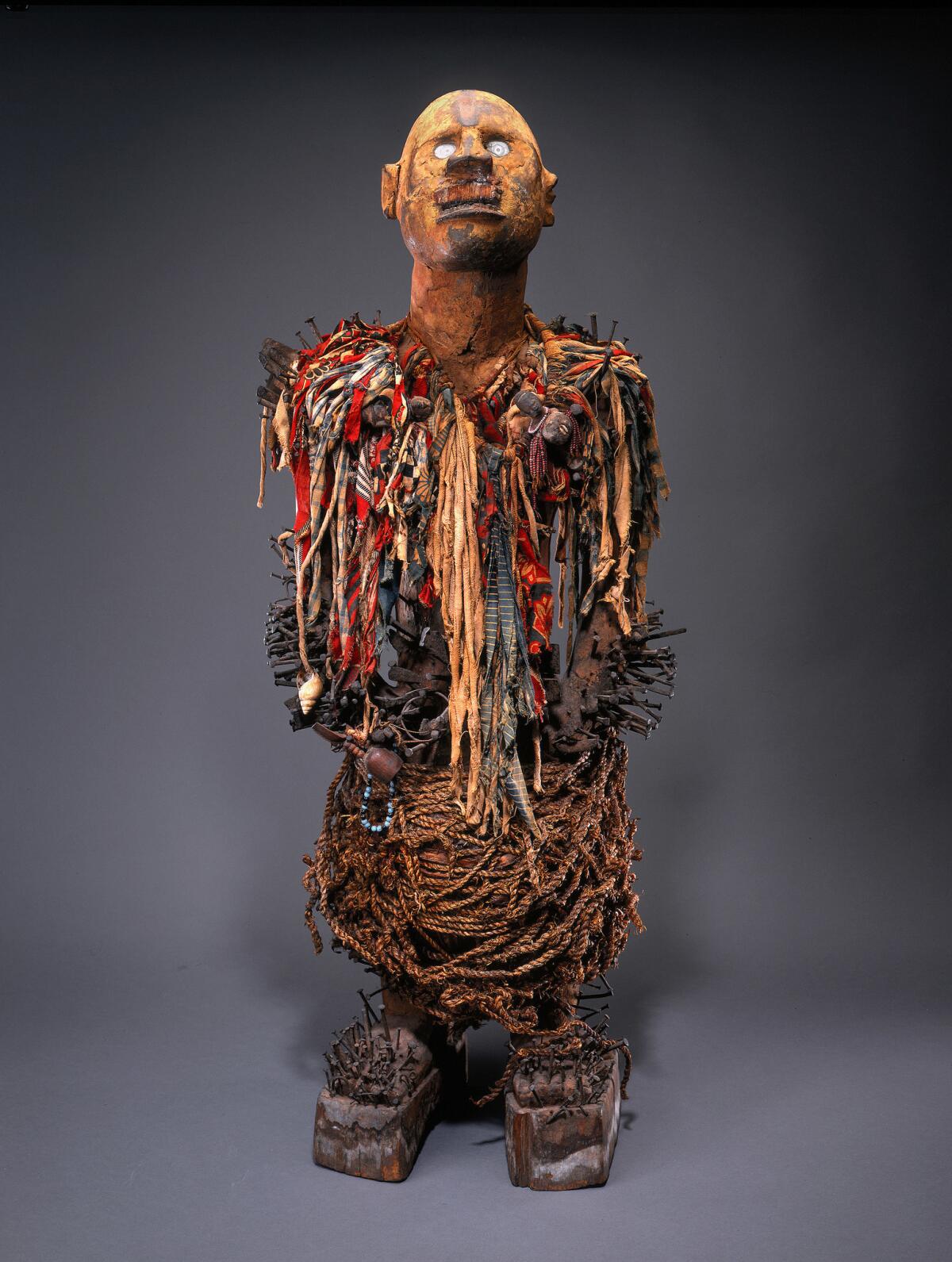
“The Archival Impulse: 40 Years at LACE,” at Los Angeles Contemporary Exhibitions. LACE, the historic Los Angeles art spot that gave key shows to Mike Kelley and groups such as Survival Research Laboratories in the ’80s, is turning 40 — and to mark the occasion, the organization has been poking around its metaphorical attic (aka its archive) to see what it might turn up. This show gathers elements from that archive as well as video works by a range of Los Angeles artists, including Jim Shaw, Susan Mogul and Reza Abdoh. Through December. 6522 Hollywood Blvd., Hollywood, welcometolace.org.
Rick Bartow, “Things You Know but Cannot Explain,” at the Autry Museum of the American West. This is the first comprehensive exhibition devoted to the late Oregon-born painter, a member of the Mad River band of Wiyot. Bartow developed a career as an artist later in life — after his service in the Vietnam War and a period contending with PTSD. On the canvas, he found inspiration, drawing from historic and contemporary European and Native American artistic traditions to create a fusion of something new: haunting and totemic images of creatures who channel grief and frailty. Through Jan. 6. 4700 Western Heritage Way, Griffith Park, Los Angeles, theautry.org.
“La Raza,” at the Autry Museum of the American West. In its day, the civil rights publication La Raza, which was based in Lincoln Heights, served as a bible for the Chicano movement, covering protest, policy and everyday life for the Mexican American communities of Los Angeles. Over the years, the paper amassed an archive of 25,000 images, recently digitized by the Chicano Studies Research Center. Many are now on view as part of this PST: LA/LA show at the Autry — and in a time of political strife surrounding the issues of civil rights, this exhibition couldn’t be more timely. Through Feb. 10. 4700 Western Heritage Way, Griffith Park, Los Angeles, theautry.org
“Water and Power” at the Underground Museum. This is the latest collaboration between the artist-run space founded by late painter Noah Davis and the Museum of Contemporary Art Los Angeles. The show will feature a range of works by the likes of Olafur Eliasson, Robin Coste Lewis, Fred Eversley and Hans Haacke, among others. Runs indefinitely. 3508 W. Washington Blvd., Arlington Heights, theunderground-museum.org.
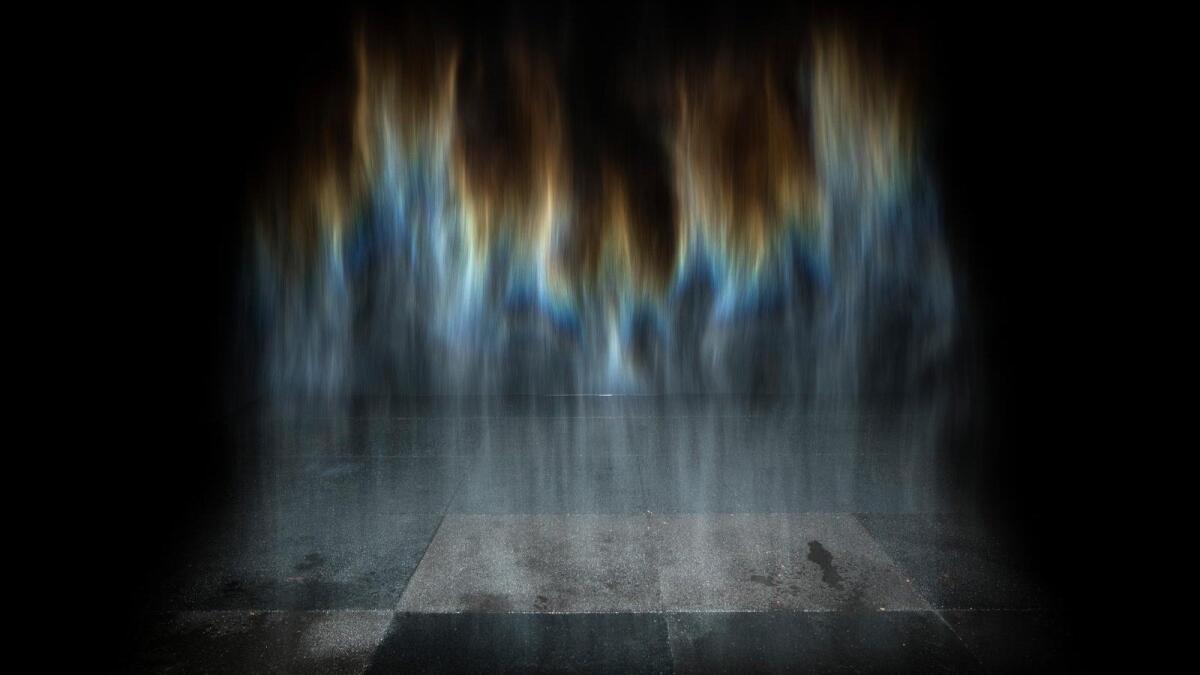
“L.A. Communities Through the Eyes of Artists,” in the Passageway Gallery at Union Station. For 15 years, L.A.’s principal train station has been showcasing work that reveals the city through the eyes of its artists. This year, it is showing a series of newly commissioned pieces — including Shizu Saldamando’s depiction of Little Tokyo, Sam Pace on Leimert Park and Artemio Rodriguez on East L.A. On long-term view; no closing date set. Union Station, 800 N. Alameda St., downtown Los Angeles, metro.net.
Alejandro G. Iñárritu, “Carne y Arena,” at LACMA. The gripping new virtual reality experience by the Academy Award-winning director places the participant in the shoes of migrants making the arduous trek through the Sonoran Desert to reach the United States. This may sound like the trivialization of what can be a fatal journey, but it is not. Iñárritu has considered all the elements that surround his virtual reality video to humanize the story of immigration on the U.S.-Mexico border. I wrote about my experience of the piece in June. It’s not cheap (a $30 special admission, in addition to regular museum fees), but it’s worth every penny. On long-term view; no closing date set. 5905 Wilshire Blvd., Mid-Wilshire, Los Angeles, lacma.org.
Daniel Hawkins, “Desert Lighthouse.” The Los Angeles-based artist is obsessed with producing works that toy with ideas of grandiosity, failure and gestures that border on the Sisyphean. (One of his goals as an artist is to ultimately build a scale replica of the Hoover Dam.) Now, Hawkins has installed a 50-foot tall, fully functioning lighthouse in the Mojave Desert in the vicinity of Barstow. The piece even features a light to guide travelers through this rugged landscape. Directions and coordinates can be found on the website. On long-term view, Hinkley, Calif., desertlighthouse.org.
Sign up for our weekly Essential Arts & Culture newsletter »
Twitter: @cmonstah
The biggest entertainment stories
Get our big stories about Hollywood, film, television, music, arts, culture and more right in your inbox as soon as they publish.
You may occasionally receive promotional content from the Los Angeles Times.



